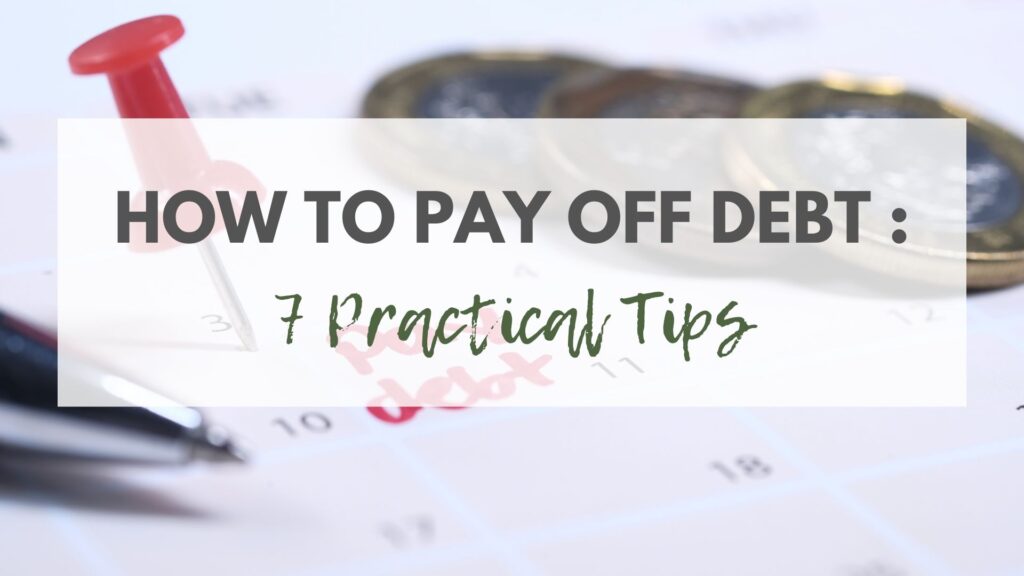
Are you looking for how to pay off your debt? Whether we like it or not, debt is part of one’s life and it can get overwhelming if not monitored. Having so much debt is seen as a normal, casual thing, but it can be damaging to your financial health now or later in the future.
I’ll be sharing some practical tips on how to pay off debt whether it’s student loans, car loans, personal loans, or credit card debt.
Here are the 7 practical tips on how to pay off debt in 2024:
1. Create a Plan
Before you decide to start paying off your debt, it’s good to have a plan or roadmap. This plan should be a guide, but not so rigid. It should be flexible to allow changes if circumstances change.
First things first: assess and consolidate your debt. It might be hard to confront but you can do this! The reward is far greater than being in this debt bubble, trust me! Doing this will give you a good picture of what you’re dealing with and how you plan to tackle it.
Create a spreadsheet or get pen and paper make a list of all your loans and write out the corresponding debt amount.
Second: write your SMART goals. An example could be:
- Specific: I want to pay off $x of [car loan, student loans, credit card debt] to become debt-free and improve my credit score
- Measurable: I’ll use debt pay-off calculators and a spreadsheet to track my progress
- Attainable: Is it possible or is it not possible to pay it off within the time frame?
- Relevant: Does this align with my mission? Becoming debt-free will reduce my stress and anxiety
- Time-Bound: I want to pay off a total of $x by the 15th of December of this year
2. Review financial health
You have a plan; you’re so pumped! The next phase is to review your financial statements. Embarking on this debt-free journey takes discipline so if you’re spending more than you’re making, that’s a big problem.
What do you spend the most on and can you cut back? Doing this will allow you to put more money into your debt. I’m not saying eat rice and beans or ramen every single day. I’m simply saying make a budget and allocate where your money is going. A budget lets you take control of your money instead of wondering where it went.
People usually spend the most money on take-out. If you eat out 4 times a week, maybe cut down to 1 to 2 times. Whatever it is that makes your pocket leak the most, try to see if you can fix it.
Remember that personal finance is 80% behavior and 20% results!
Related Content:
3. Choose a payoff method
So what next? How do you want to pay down your debt? There are two main methods: snowball and avalanche methods.
The Snowball method means you start paying down debt with the smallest balance and work your way to the highest balance last. For example, if I have 2 student loans of $5,000 and $10,000. I would start with $5,000 -> pay it down to $0 then move on to the $10,000 amount until it’s paid off. This method works best for those who need to see immediate results and it’s also very motivating to see your progress.
Now, with the avalanche method, you tackle the balance with the highest interest first and the smallest interest last. This method helps you save money because interest is not accumulating fast. For example, if I have credit card debt of $2,000 @19.5% and $3,000 @ 7%, I would start with the $2,000 balance -> pay it down to $0 and move to the $3,000 last.
Make sure you do what’s best for you and your financial situation. If none of the methods above work for you, that’s fine. All that matters is you have a plan!
4. Increase income
There’s a limit to how much you can cut back or reduce when it comes to your expenses. However, there’s no limit to how much you can make! Making more money gives you more options to do the things you want to do and also allows you to throw extra at your debt.
Think of side hustles you can do during your spare time. For instance: dog sitting, driving Uber, or selling on Poshmark/Mercari.
>> 30+ lucrative Side Hustle Ideas For 2022
Tip: Pay more than the minimum payment. That will help you pay off debt faster.
Related Content:
- 25 Flexible Ways to Make Money in College
- How to Properly Manage Your Money
- How to Start Investing in Stocks With No Experience
- How to Get Your First Internship or Full-Time Job
5. Consider other methods
Many student loan forgiveness programs are meant for borrowers who work in public service, education, health care, and other fields. After 120 payments, you can qualify for 100% loan forgiveness. The Federal Student Aid website goes into detail about the requirements and eligibility to apply for the loan forgiveness program.
If you have credit card debt with a crazy amount or on multiple cards, you can consolidate them and do a balance transfer on a new card. Balance transfer cards usually offer a 0% APR for 15-18 months meaning you pay ZERO interest until the 0% expires. This is great because you save money on interest and it allows you to pay it down faster.
If you have a high interest rate on your student loans, car loans, or mortgages, you can do refinancing. With a great credit score, you can get a new loan term at a lower rate. Do your research ALWAYS!
6. Negotiate
Not all debts are negotiable like student loans. However, you can negotiate to reduce the interest rate on your credit card. Did you know that??! I was surprised when I found out too!
Credit cards have the worst and highest interest rates because that’s how they make their money. Instead of putting money into credit card companies’ pockets, try to be a diligent credit card user and pay off your balance every single month. Call your credit card bank and ask to reduce the APR (annual percentage rate).
If you have medical debt, call your hospital or the collection agency (if it’s being sold to collections) and make a deal or payment plan with them. Ask for a financial assistance program to see if you’re eligible and take advantage of it.
For tips on how to negotiate, I highly recommend you read I Will Teach You to Be Rich by Ramit Seth. I love the book; it provides simple and practical steps to managing your money from paying off debt to investing.
7. Avoid more debt
Get out of debt by not entering into one again. Stop using your credit cards, instead use cash or debit cards. Try to be intentional with your spending and cut back on unnecessary spending. I’m not saying live on rice and beans but be mindful of how much is going out of your pocket versus what’s coming in.
Here are some methods to curb additional credit card debt: freeze your credit card, cut it, or keep it out of sight. Start using your debit card or cash.
In closing thoughts, I hope this post gave some practical tips on how to pay off your debt. Know that you’re not alone and you will get through it! Good luck!!
Please share your thoughts on this post in the comment section!


